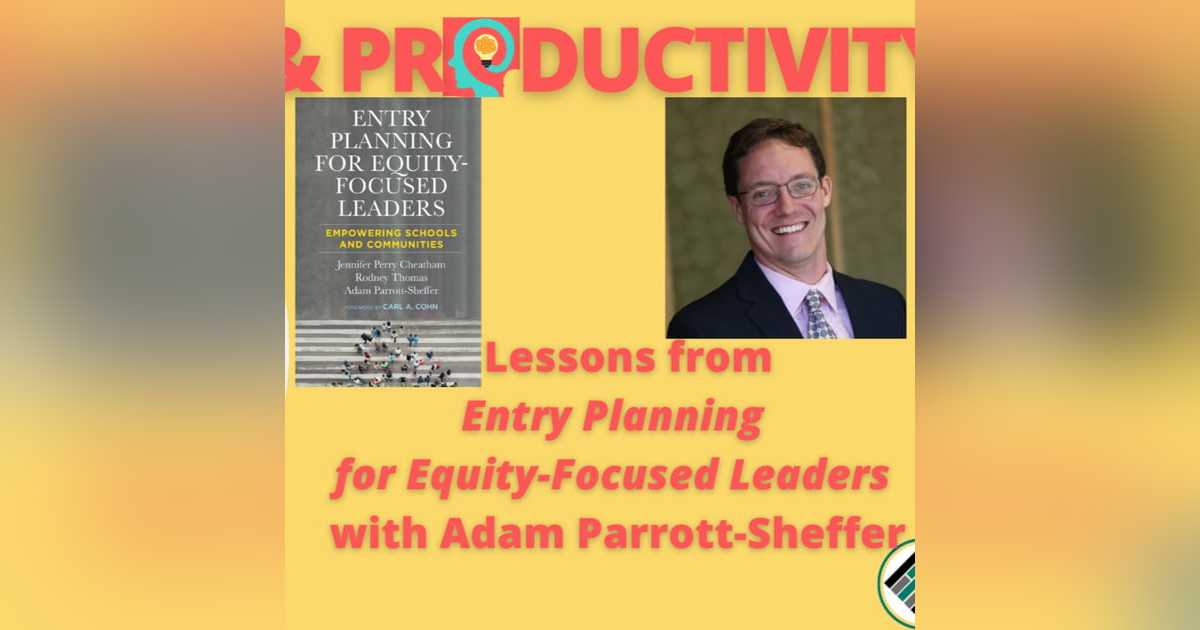Lessons from "Entry Planning for Equity-Focused Leaders:" with Adam Parrott-Sheffer

Lessons from "Entry Planning for Equity-Focused Leaders:" with Adam Parrott-Sheffer
As a principal transitioning into a new position, I searched for the literature on entry plans and discovered "Entry Planning for Equity-Focused Leaders: Empowering Schools and Communities." In this practitioner-focused and action-oriented work, Jennifer Perry Cheatham, Rodney Thomas, and Adam Parrott-Sheffer consolidate their extensive experience centering equity in leadership. They affirm that the entry of a new leader, or the pivot of an established one, affords an unparalleled opportunity to garner the insight, trust, and commitment to establish a basis for positive, equitable transformation within a system.
Today I have the distinguished honor of interviewing Adam Parrott-Sheffer, one of the co-authors. He was interviewed on Wisdom & Productivity when the show had just started and I am thankful he’s back for a second time.
Adam is a former nonprofit and school district senior leader. His areas of expertise include: leadership entry, team development, board management, and program evaluation/impact.
—QUESTIONS FROM THE PERSPECTIVE OF A PRINCIPAL
Adam, how are you feeling?
Please share with us the origin story of the book.
Can you explain what an entry plan is and how it can help school principals achieve their goals?
Why is equity such an important consideration for school principals, and how can an entry plan help them promote equity within their schools?
Entry plan phases
Reflect
Listen and Learn
Plan to Act
Why is it important to develop a leadership story?
Can you describe what empathy interviews look like?
How to input this information and how to disaggregate this qualitative data in a way that makes sense?
Can you tell us about the importance of political mapping?
How can principals decide who to talk to? Are there some people one must avoid?
Are the most important questions:
What do you like about ______?
What do you want to see better or improve?
How can one engage non dominant voices?
The book talks about superintendents getting a team and even hiring consultants; how can principals adapt this advice?
Quote: “A leader must connect values and strategy through EMOTIONS to generate collective action.”
How can principals share findings?
James Baldwin quote: “not everything that is faced can be changed, but nothing can be changed until it is faced.”
An example of a CORRESPONDING STRENGHTS-BASED LANGUAGE: “the highest form of school love is the belief that each student is capable of excellence and deserving of deep learning and critical feedback”
How to persuade the teachers or administrators who want to put blame on things that we cannot control?
What is your advice on creating report of findings
Without offending people
Sensemaking process
And making time for healing
The three authors expressed they did everything they were supposed to do but didn’t center the importance of healing, self-care, and care for others – perhaps THIS IS THE MOST IMPORTANT SHIFT
Wondering if this will delay the expected progress districts have for principals — what advice do you have importance of self care as act of resistance
Cheatham mentioned that she worked 14 hour days and this took a toll in the family
The advice of not emailing people at night as it can trigger negative emotions
Should principals schedule email time?
Adam expresses his gratefulness on the last pages for those that supported him and mentions joyful learning; can we end the show by you telling us on how we can make learning (and teaching) joyful again?







